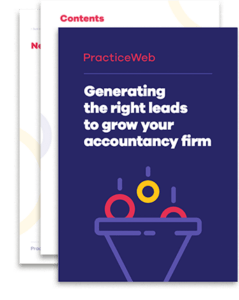When you’ve put time and effort into your marketing activities, you might be eager to start seeing results. But sometimes, the most effective lead generation tactics are the ones that take longer to pay off.
Recently, we at PracticeWeb have been talking a lot about the importance of building meaningful connections over going straight for a hard sell.
It’s especially important at a time like this, when most people are cutting back on spending where they can, and when, to put it bluntly, it feels like bad taste to aggressively push people towards buying your service.
This doesn’t just apply in a time of crisis, however. We think it’s better under any circumstances to prioritise long-term relationships with your clients over short-term sales, and to use your marketing activities to build those relationships.
Taking this approach is good for your clients – it helps to inform them before they buy, and give them confidence in your quality of service – but it’s also good for your firm. It means you can focus on attracting the specific type of client you want to work with, and keeping them on board.
Getting leads to come to you
Lead generation is all about gaining interest in your business, so that potential clients will get in touch, and eventually make a purchase.
In the days before the internet, a potential buyer would usually need to contact a seller to get more information about the product or service, and the sales process would go from there.
The sales team would be the main source of information for a customer as they considered their purchase, making it much easier to influence their decision.
Now, the abundance of information available online means customers can learn a lot about a product or service before needing to contact the seller.
At the same time, the availability of instant messaging services means phone calls in general are becoming less popular, and customers are less willing to make a call if they can avoid it.
Research by Ofcom shows that while mobile data usage has increased rapidly in recent years, the volume of outgoing calls has been steadily declining. Outgoing calls from fixed lines decreased by 17% from 2017 to 2018, and calls from mobiles fell by 5%.
This increased access to information means customers are more likely to have found the business themselves – rather than responding to an advert or a cold call, they’ve looked for a service they need, clicked on a link to your website, and specifically chosen your firm over the other options available.
Increasingly, buyers are the ones in control of the sales process. But there are things you can do to attract their attention, and to encourage the right leads to get in touch.
Be the expert
This change to the buyer journey is a challenge in some ways, but an opportunity in others. Now that potential clients are actively searching for expert information on tax, accounting and business topics, your firm can grab the spotlight by providing it.
Useful, well-written content can help to move a prospect closer to making a purchase by reassuring them of your credibility and demonstrating your expertise.
If a blog post you’ve published helps someone deal with a part of their tax return they didn’t understand, for example, they’re more likely to think of you later on when they start looking for an accountancy service.
Creating the right kind of content comes with the additional benefit of improving your position on search results. Search engines like Google value high-quality, relevant content, so the more of this you produce, the more likely you are to move up the search result rankings.
It’s important to remember that this is a long game, however. It requires a sustained effort to gradually build your authority, and that’s best done with a structured content plan.
Know who you’re talking to
Before you start planning or writing content, you should have a clear idea of who it’s for. Without this, your content can easily end up being unfocused and bland.
Plus, it’s much harder to compete with other websites and get found online if you’re only posting broad, general content.
If you don’t have a niche already, it’s worth thinking about whether you could focus your business on a section of the market, and establish yourself as a specialist.
Creating a buyer persona can also be a helpful exercise to visualise your ideal client.
Once you know who you’re writing for, try to keep them in mind whenever you produce content. Think about why they would be interested in the topic you’re covering, what they would want to know, and what action you want to encourage them to take next.
Find the next big thing
When you’re planning your content for the long-term, it’s often helpful to think about what the next major change in tax or business regulation will be for your clients. What will they need your advice on in the future, and what might they be searching for online?
Creating content on these kinds of topics will help to drive some of that search volume towards your website.
One recent example of this was the introduction of Making Tax Digital (MTD) for VAT in 2019, which saw many accountants changing their own processes, as well as reaching out to clients who needed to change theirs.
This acted as an opportunity for accountants to attract new prospects and establish a reputation as a digital accounting expert, by providing valuable information on what was about to change and what businesses needed to do.
Depending on the sectors your clients work in, the next big changes on the horizon might include reverse charge VAT for the construction industry, which is due to take place in October 2020, or the extension of IR35 to the private sector in April 2021.
As both of these examples have previously been postponed, you might worry about putting all your efforts into covering an important measure now, only for the deadline to be moved at the last minute.
But as long as you update your content promptly as changes happen, this can actually be a good thing.
Because pages on your website build up authority over time, older pages are generally more likely to appear in search results than brand new ones.
So, even if you only have limited information right now, creating an initial page then adding to it over time should give you an advantage over newer pages in a year or two.
Accounting firms that set up MTD hubs early on, or posted about it on their blogs regularly, were well placed to draw in traffic as the implementation date drew near. Again, this is a long game.
Content marketing is one of several tactics that can boost lead generation for your firm, and should be used as part of a targeted marketing strategy.
If you want to know more, our complete guide to lead generation for accountants covers everything you need to know about attracting the right customers, keeping track of the buying process, and measuring your success.
Like and share using the buttons below.




